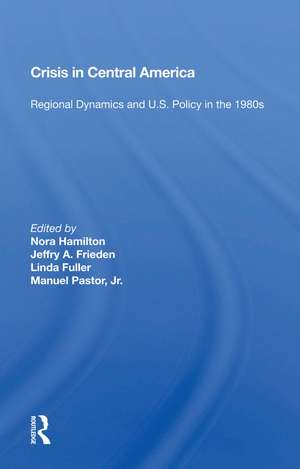Crisis In Central America: Regional Dynamics And U.s. Policy In The 1980s
Editat de Nora Hamiltonen Limba Engleză Hardback – 7 iun 2019
Preț: 764.20 lei
Preț vechi: 1027.40 lei
-26% Nou
Puncte Express: 1146
Preț estimativ în valută:
146.24€ • 151.76$ • 122.24£
146.24€ • 151.76$ • 122.24£
Carte tipărită la comandă
Livrare economică 15-29 martie
Preluare comenzi: 021 569.72.76
Specificații
ISBN-13: 9780367014223
ISBN-10: 036701422X
Pagini: 284
Dimensiuni: 152 x 229 mm
Greutate: 0.45 kg
Ediția:1
Editura: Taylor & Francis
Colecția Routledge
Locul publicării:Oxford, United Kingdom
ISBN-10: 036701422X
Pagini: 284
Dimensiuni: 152 x 229 mm
Greutate: 0.45 kg
Ediția:1
Editura: Taylor & Francis
Colecția Routledge
Locul publicării:Oxford, United Kingdom
Cuprins
Preface -- Introduction -- U.S. Policy in Central America: Recasting Hegemony -- U.S. Policy Toward Central America: The Post-Vietnam Formula Under Siege -- The Reagan Administration, Congress, and Central America: The Search for Consensus -- Central American Refugees and U.S. Policy -- "Low Intensity Warfare": The Counterinsurgency Strategy for Central America -- Negotiation in Conflict: Central America and Contadora -- Central America: External Pressures and Internal Dynamics -- The Central American Economy: Conflict and Crisis -- The Central American Crisis and the Common Market -- The Hidden War: Guatemala's Counterinsurgency Campaign -- Exporting Democracy: The Unanticipated Effects of U.S. Electoral Policy in E1 Salvador -- Civil War, Reform, and Reaction in El Salvador -- The Nicaraguan Experiment: Characteristics of a New Economic Model -- A Multitude of Voices: Religion and the Central American Crisis -- Central America and the United States: A Chronology of Events from 1979 to 1987
Descriere
In the early years of the recent Central American crisis, analysts often predicted a rapid, dramatic resolution—whether by revolutionary victory or through military intervention by the United States. The 1980s, however, have witnessed an intensification of conflicts with increasing U.S. involvement. Rather than standing at the brink of a sharp turning point, Central America is at an interim point in an evolving historical process. This text provides an assessment of this process and of its immediate and long-term implications for the region and for U.S.-Latin American relations. It focuses on the complex and contradictory effects of the Reagan administration's efforts to influence the Central American debate within the United States and to reestablish U.S. hegemony in the region itself. The first part of the book examines the development of various aspects of U.S. policy toward Central America. In particular, contributors discuss the interaction between the executive and legislative branches in shaping U.S. strategy, the implications for constitutional democracy of presidential control over foreign policymaking, the treatment of Central American refugees, the counterinsurgency strategy of "low intensity warfare," and the effects of U.S. policy on regional peace initiatives put forward by Mexico and other Latin American countries. In the second part, contributors analyze external pressures on Central American countries and regional dynamics. They begin with a discussion of the economic crisis—aggravated by conflicts in the region—and regional integration. Other topics include the ambiguous position of the Catholic church, Guatemala's "hidden war," "demonstration elections," the changing balance of forces in El Salvador, and the obstacles Nicaragua faces in constructing a new economic development model. Nora Hamilton is associate professor of political science and Linda Fuller is assistant professor of sociology at the University of Southern California. Jeffry A. Frieden is assistant professor of political science at the University of California, Los Angeles. Manuel Pastor, Jr., is assistant professor of economics at Occidental College.
